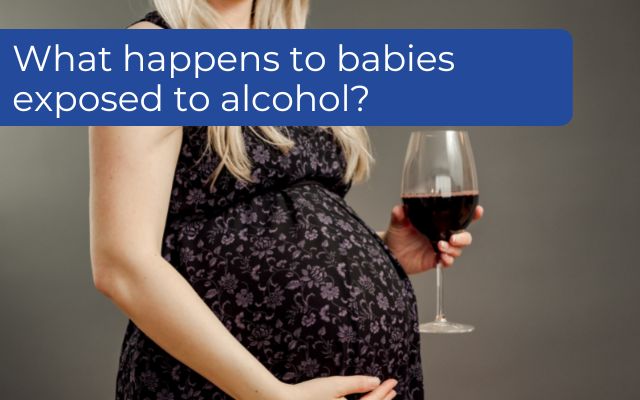Using alcohol during pregnancy can have serious, and even fatal, consequences for babies, which begs the question, what happens to babies exposed to alcohol? It may be very difficult for pregnant women who are addicted to alcohol to read this post but it is intended to educate, not to judge. We urge you to seek treatment sooner rather than later for the best outcomes for you and your baby. Drug and alcohol use during pregnancy can affect the development of the baby in a number of ways. In this blog we will take an in-depth look at the ways in which alcohol can affect an unborn foetus and a newborn baby. We will also look at the long-term impact on children exposed to alcohol in the womb.
While there is a belief that a drink here and there will do no harm, the expert advice is that there is no safe level of alcohol consumption during pregnancy. Read on to learn more about the risks associated with alcohol abuse and addiction while pregnant.

Alcohol use, abuse and addiction in SA
South Africa ranks high in terms of the world’s biggest drinkers. Data from the World Health Organisation for 2015 ranked the country as the third biggest drinking nation in Africa and number 19 globally.
More than a quarter of South Africans who drink are classified as binge drinkers. According to the latest data available from the South African Community Epidemiology Network on Drug Use, the last half of 2020 saw an increase in the number of people attending addiction treatment reporting that alcohol was their primary drug of use. This ranged from 8% of people in Gauteng to 34% of people in KwaZulu-Natal seeking treatment for alcohol addiction.
Globally, around one in 10 pregnant women consume alcohol, according to the World Health Organisation.Rates in South Africa are at least double the global average. Studies have found that between 20% and 40% of pregnant women in South Africa consume alcohol, making prenatal alcohol exposure a significant local public health problem.
Foetal alcohol spectrum disorders (FASDs)
FASDs is a group of conditions present in some people who were exposed to alcohol in the womb. These conditions range from physical problems to issues related to learning and behaviour and can be mild or severe. Foetal alcohol syndrome is the most extreme form of FASDs.
Physical defects of FASD include:
- Distinctive facial features such as small eyes, thin upper lip, increased distance between the inner corners of the eyes and a smooth skin surface between the nose and upper lip
- Deformities of joints, limbs and fingers
- Slow physical growth before and after birth
- Problems with vision and hearing
- Smaller than average head circumference and brain size
- Heart, kidney and bone problems
Brain and central nervous system problems include:
- Poor coordination and balance
- Intellectual disabilities and learning difficulties
- Trouble with memory and attention
- Problems with problem-solving
- Poor judgement
- Rapid mood swings
Social and behavioural problems include:
- Difficulties in school
- Poor social skills
- Issues with impulse control
- Difficulties related to adapting to change
A person does not have to have all of the above symptoms to be diagnosed with FASD and affected people might have different combinations of symptoms that also differ in severity.
Rates of FASDs in South Africa are reportedly higher than anywhere else in the world. The global average for FASD is estimated to be 1.5% while the national average for South Africa is 6%. However, rates are as high as 28% in some communities in the Western Cape.
Dropped our loved one in the safe hands of Changes Northcliff 2 years ago. We are forever grateful for the transformation we have experienced. The facility is receptive and staff are professional and compassionate.
I am now 2 years, 10 months and 19 days clean and sober, thanks to Changes rehab. Some of the main points I was suggested to do were to play the movie through and live life for today.
The day I first came to Changes, I was shown around and knew then that our daughter needed to in the best care possible. Changes team members understood her needs even before meeting her. Thank you for everything.
Filled with love and rules, Changes will get you on the straight and narrow and help you find the real you. The structure and support they provide are truly life-changing, I am a very different person today.
My son was on the brink of destruction, but Changes stepped in. Their comprehensive approach and dedicated staff transformed him into a person I never thought I'd see again. Thank you for giving me my son back.
Alcohol and other birth outcomes
Using drugs during pregnancy can raise the risks of miscarriage, stillbirth, low birth weight and preterm delivery. Alcohol is not different.
Research has found that women who consumed more than three drinks daily had a more than threefold risk of having a miscarriage. Other studies on more moderate alcohol use have found that drinking even three drinks per week significantly raised the risk of miscarriage.
Stillbirth, which is when the baby dies after 20 weeks, occurs at higher rates in women who consume alcohol during pregnancy. Studies have linked drinking five or more drinks per week with a threefold increase in the risk of having a stillbirth. A large study which looked at over 600 000 births found a 40% increase in the likelihood of stillbirth in women who consumed any amount of alcohol compared to those who didn’t drink.
There are a number of risks associated with being born prematurely which is when a baby is born before 37 weeks. Premature babies are at risk of a number of complicated medical and developmental problems although there are many preterm babies who do not experience complications. Short-term complications include breathing, heart, brain, temperature control, and immune system problems. Long-term complications include learning, vision, hearing, behavioural and psychological problems as well as cerebral palsy and other chronic health issues.
Alcohol use in pregnancy raises the risk of preterm delivery, particularly heavy use such as drinking 10 or more drinks per week. Research has suggested that the risk of having a baby with a low birthweight (weighing less than 2.5kg) increased in mothers who drank more than 12g of alcohol per day.
Babies with a low birth weight can be healthy but many are not. They are 20 times more likely to develop complications and die compared to babies of normal weight.
What about men?
Much of the pressure to abstain from substances is placed on mothers, but fathers who drink can also impact the health of their children. A study of over 520 000 couples found that there was a 35% increase in the risk of birth defects if a father drank alcohol regularly up to six months before conception.
No safe amount of alcohol
While the negative impact of alcohol on babies is highest in heavy drinkers, no amount of alcohol during pregnancy is deemed safe, according to the Centers for Disease Control and Prevention. Additionally, there is no safe time to drink during pregnancy as a baby’s brain develops through a pregnancy and is therefore always vulnerable.
The risks of using alcohol during pregnancy are well-established. In this blog we provided an in-depth look at the risks, according to science. It is important for pregnant women addicted to alcohol, as well as would-be fathers, access treatment as soon as possible to limit the risks to their babies.
Are you in need of rehab treatment for alcohol addiction? Contact us today!
Alcohol and pregnancy seriously harm babies exposed to alcohol, altering brain development, growth and behaviour with lasting physical and cognitive effects. Changes team counsellors are here to help you.Alcohol And Pregnancy Effects On Babies Health And Brain










